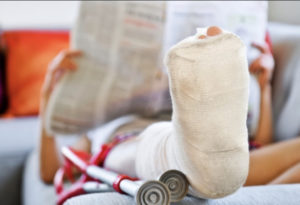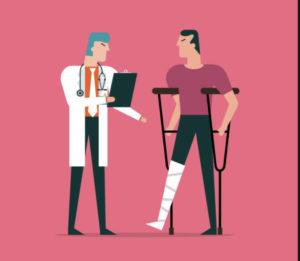After a fracture or break, your bone needs to rebuild, and a healthy well -balanced diet that includes bone healing nutrients can help speed that up.
We’ve received a few requests for advice on broken bones this week, so here’s our checklist of what you need to include in your diet to help get you moving again…
PROTEIN
Roughly half of your bone structure is made of protein – it’s an essential part of the repair process. It also helps your body utilise Calcium, another important nutrient for healthy bones
Sources of Protein: Meat, fish, eggs, nuts, seeds, beans
CALCIUM
You will know from the adverts on TV that healthy strong bones require calcium, but the best sources of calcium don’t come from flavoured yoghurts, ice cream or fortified foods.
Sources of Calcium: Green leafy veg, broccoli, organic milk, kefir, organic unflavoured yoghurt, almond milk and sardines.
MAGNESIUM
Did you know absorption of calcium relies on Magnesium? Remarkably, magnesium is needed for over 300 processes in the body!
Sources of Magnesium: Beef, dark leafy greens, almonds, beans, seeds, avocados
VITAMIN C
Studies suggest that vitamin C can increase the healing process, and it’s also great for immune health and reducing inflammation. Collagen is a protein that’s an important building block for bones, and vitamin C helps your body to make collagen. You can get vitamin C from many foods, but ageing and the heat process in cooking loses some of the vitamin C content.
Sources of Vitamin C: Bell pepper, kiwi, berries, citrus fruits, tomatoes, sweet potato, broccoli and you guessed it… dark leafy greens! We recommend you choose frozen where possible.
VITAMIN D
This vitamin helps your blood use calcium to help build up the mineral in your bones. Exposure to the sun daily is the best source of vitamin D but through the winter months some extra supplementation might be necessary (always speak to a nutritionist before supplementing)
Sources of Vitamin D: Salmon, eggs, sardines, liver and cod liver oil.
Click here for our article on Vitamin D
Whether it’s a fracture or a break or you just want to protect yourself from injury, aim for plenty of fruit and veg in your diet, moderate amounts of organic meats, healthy fats and adequate amounts of protein daily.
Avoid processed foods with hidden salts and sugars and fizzy flavoured drinks which can affect the absorption of nutrients and slow down your healing progress.
If you need advice on supplementing with any of the above nutrients or ideas on how to included these in your diet – get in touch!

